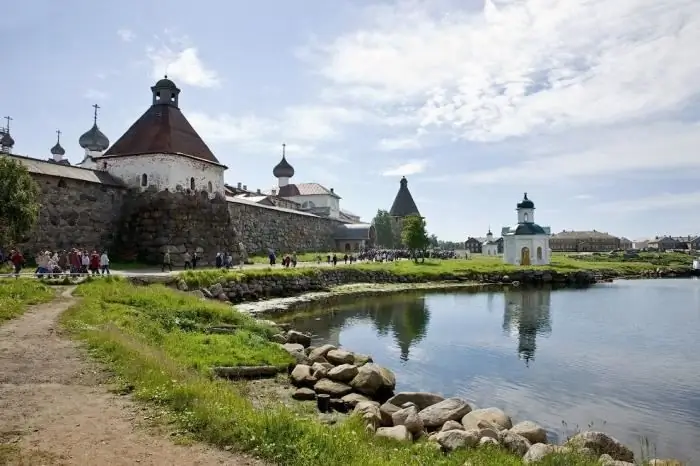- Author Harold Hamphrey hamphrey@travelwaiting.com.
- Public 2023-12-17 10:06.
- Last modified 2025-01-24 11:10.
Valaam is a large, rocky, green archipelago in Lake Ladoga. Its territory is occupied by one of the 2 Russian "monastic republics". The population of the archipelago is monks, forest rangers and fishermen.
In this article, we will dwell in more detail on what Valaam and the Valaam archipelago are.
General description of the archipelago
The Valaam archipelago is the main attraction of Northern Ladoga.
Formally, this territory is subordinate to the city of Sortaval (Republic of Karelia).

Total area - 36 sq. km, the coastal length is more than 150 km, the heights of the islands reach up to 70 meters above sea level. Heavily indented by bays (or skerries), the shores are covered with trees (mostly coniferous), hayfields and fields.
There are more than 50 islands in total (Krestovye, Bayevy, Moscow, Nikonovsky, Skitsky, Predtechensky, Defensive, Divny, Goly, Emelyanov, Granite, Rocky, Zosima, Rye, Ovsyany, Onion, Nikolsky, etc.), among more thanValaam stands out for its impressive size (an area of 28 sq. km). There is a village with the same name and the magnificent Valaam Spaso-Preobrazhensky Monastery on it.
There are also sketes on some islands: Predtechensky, Nikolsky and Svyatoostrovsky on the islands of the same name; Smolensky and All Saints on about. Skitsky; Avramius of Rostov (Emelyanov Island). Many islands are connected to each other and to the largest Valaam by bridges.

Where is the Valaam archipelago located?
The archipelago is located in the northern part of the great Lake Ladoga. Most often, the entire archipelago is called Valaam. The island is located 22 kilometers from the mainland.
This area is amazing and historically unique. The nature is also magnificent in these places: beautiful mossy rocks on the shores of Lake Ladoga, evergreen coniferous forests and the majestic blue domes of the main Cathedral of the Transfiguration of the Savior. This region attracts many tourists not only from Russia, but also from all over the world. The nature of the Valaam archipelago is amazing.

History in Brief
The settlement of the islands began in the 10th century. From the 12th century they belonged to Novgorod.
The main monastery, which also served as a defensive fortress, has existed since the 14th century. The Swedes ravaged the islands in 1611, and the monastery was destroyed. It was restored only in 1715.
As part of Finland, the archipelago existed from 1918 to 1940, since 1940 these lands belong to Russia.
The Valaam archipelago, in particular the Valaam Monastery, stood at the very origins of the birth of Orthodoxy throughout the world.

There is a legend that tells that Andrew the First-Called (apostle) preaching the gospel reached the far north (Valaam Island), where he installed a stone cross. And the monks Herman and Sergius, the monks who arrived on the lands of Ladoga in the 10th century from Greece, are recognized as the founders of the brotherhood of the monastery.
It should be noted that Valaam was once one of the largest printing centers in Russia. The monastery suffered the most difficult times from the historical year 1917.
In the 1950s, war invalids, mentally retarded and tuberculosis patients were settled in the buildings of the monastery and sketes. In 1984, the House for the Invalids was closed, and in the 90s the monastery was assigned to the Russian Orthodox Church. Now it is a monument of world significance.
Valaam Island: attractions, features
The waterway to the island along Ladoga reveals the splendor of the local nature: the soft waves of the lake, the breeze, numerous seagulls, granite shores with pine groves. Here you can find a real spiritual refuge.

Valaam archipelago almost all of it is an amazing historical and natural landmark. For the most part, tourists come here as pilgrims or as part of tourist groups. There are also independent travelers.
There are a little more than 200 permanent residents on Valaam, and most of them aremonks.
Besides the monastery, there is also the village of Valaam and a small military base. For some reason, relations between monks and secular islanders are complex, just like on Solovki. On the island, orders are established by church authorities.
In the cathedral there is an opportunity to hear the famous Valaam church singing, which has been actively reviving lately.
The most impressive and oldest attraction is A. Svirsky's skit on about. Saint, 8 kilometers from the monastery. Almost all sketes on the islands attract the attention of tourists with their diversity.
There are also places for those interested in military history. In the south of Valaam preserved the remains of military installations of the Mannerheim line.
Rest on the Valaam archipelago is one of the most beautiful, calm and romantic.
Origin of the name of the island
Most likely, the name of the island comes from the Finno-Ugric language "valamo", which means "high, mountainous land". And this corresponds to the appearance of the numerous islands of the archipelago.
Russian monks considered this name consonant with the name of one of the biblical prophets Balaam.
Conclusion
For many centuries, when the monastery was the only owner, gradually the Valaam archipelago turned into a large single architectural and natural complex.
Throughout its history, chapels, churches, sketes and various outbuildings were built here. Roads have been laid, bridges between islands have been built, beautiful gardens have been grown and trees have been planted.
Valaam is one of the 4 existing in the whole world"monastic republics" (2 of them Meteora and Athos in Greece and 2 in Russia - Solovki and Valaam). But unlike Solovetsky, the owner of which is a museum-reserve, on about. Valaam monastic traditions have been revived almost in full.






